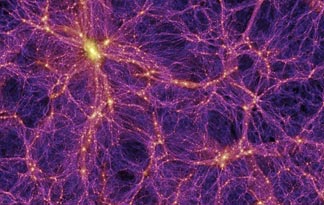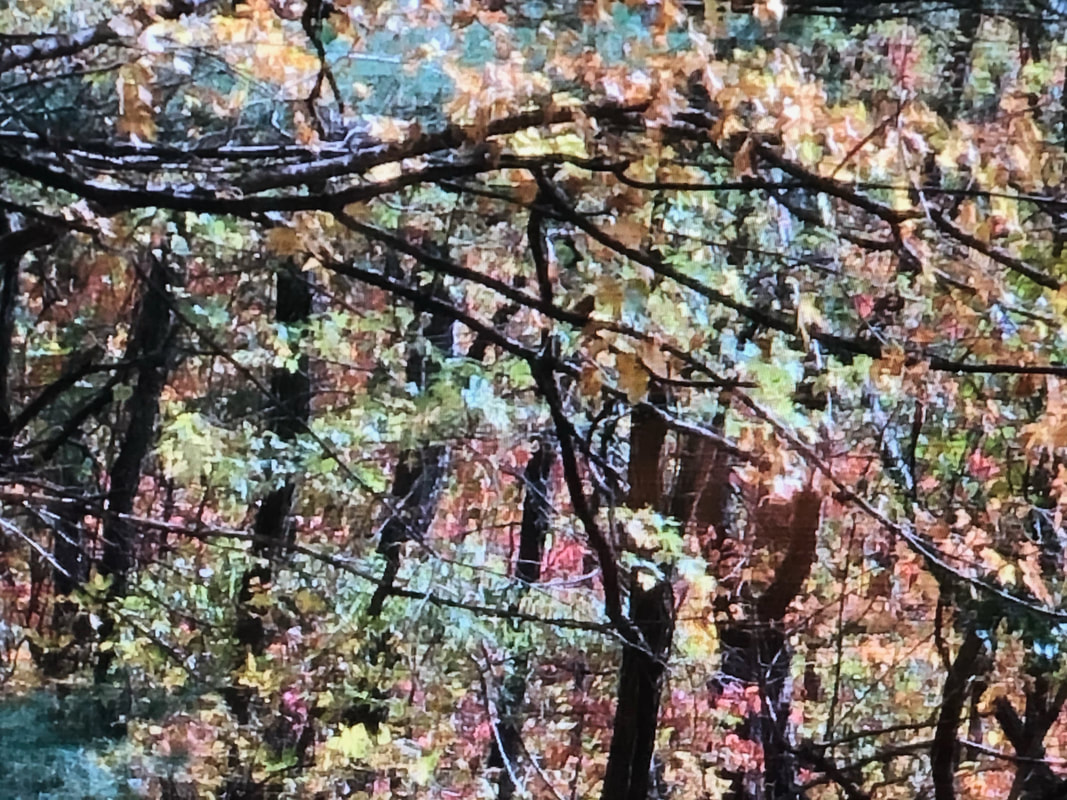“Gosh! Takes me back to college English lit class. I struggled with that one. It’s a long poem, isn’t it?”
“Like about 11,000 lines. Goes on like the Cosmos. That is forever for the student trying to get the thing read before the test or paper due date. (No wonder Spark has become a publishing success; they make a sale to everyone who doesn’t have a smart English major friend to explain the poem) For college students, Milton should have named it Go Ahead, See if You Can Read This before the Test. Anyway, he has that famous line, ‘The Mind is its own place and in itself, can make a Heaven of Hell, a Hell of Heaven.’ Well, with a little modern information from cosmology and neuroscience, he might have written, ‘The brain is a place much like the Heavens.’”
“Why?”
“Think of images you have seen of neurons, their dendrites and axons that make many connections. Looks like a bunch of octopuses got together in Chicago, where railroad tracks spread like tentacles into the continent--if I can borrow an image from Frank Norris—all reaching to touch other octopuses where more tracks bifurcate like tentacles reaching toward other train stations and further ‘tentaclization’ that makes up the neuronal network.”
“Frank who?...Nevermind, didn’t pay attention in English class because of that redhead in the short skirt…Network?”
“Yes…And, wait! You’re not saying you had a thing for Suzy Mitchkins? I didn’t realize…So, as I was saying, the network of neurons inside the head seems to mimic the network of matter spread throughout the Cosmos itself, with galaxies and galaxy clusters serving as the ‘train stations’ or hubs or octopus heads. The brain might not make Hell into Heaven, but it sure can imitate the structure of the heavens. That’s what some recent modeling seems to say. Drs. Franco Vazza and Alberto Feletti compared the neuronal network and the Cosmic Octopuses, finding a remarkable similarity, though on vastly different scales. The brain’s network occurs on scales of a single micrometer to a tenth of a millimeter. The scale of the Cosmos is larger, ranging from five to 500 million light-years. Nevertheless, images of the brain’s neurons and cosmic models seem to parallel each other. The astronomers don’t use octopuses for their models, but rather spider webs, so they speak of the Cosmic Web.” *
“You’re saying the inside of my head looks like a mini Cosmos?”
“Not me, Vazza and Feletti. They point out a remarkable similarity of structure. I wonder whether or not similar structures can be found. I think of deciduous trees in a forest, their trunks serving as neurons or galaxies with branches reaching out to touch nearby branches, all serving as axons or cosmic webs of matter (see pic below). What if, just what if, it isn’t something like a Fibonacci sequence or some Golden Ratio that connects All That Is, but rather a mirror image of the Cosmic Fabric? What if the secret code of the universe is octopuses and tentacles, networks like the axons and dendrites?”
“Sorry, what? I was thinking of Suzy. Oh! Yeah. I get it. On the scale of little things like people’s brains, there’s a reflection of a larger order or, if not order, then similar scattered arrangement.”
“Precisely, the microcosm reflects the macrocosm of which it is a part. And that seems to apply to many comparable structures, a family, for example, as a reflection of society as a whole. A group of people reflecting ideas as a whole and the way to pursue the future. Think of seminal works of philosophy, political, and social movements, or think of sacred texts that serve as macrocosms that envelope human microcosms who exist within those philosophies, politics, societies, and religions.”
“That doesn’t inspire much confidence in the importance of the individual, in MY importance or significance.”
“No, not if you think you are an insignificant or small part of something larger, some little sucker on the tentacle of a octopus, but then, there’s much to credit that individual sucker. Some neuroscientists think that the brain of an octopus might be a little different from our brains, that the critter’s brain is kind of spread out, all the tentacles taking part in the system and without which the system is less effective, though it is still capable. Every sucker is a little brain, so to speak. Hey, you lose some axons and dendrites, you lose some memories or functions. The macrocosm is different with different microcosms. You serve a purpose, after all. You, among all the branches of the forest, among all the Cosmic tentacles or webs, you have a role to play. You don’t have to be a passive sucker. You can sense what’s around you, see the connections, feel, and decide. Sure, you can’t get outside your specific tentacle, but that tentacle depends on you, all the other suckers and the head depend on you and your contributions. Milton’s ‘mind’ doesn’t just make heaven of hell; it is the heavens.
“But then…But then I could be wrong. We have a tendency…We tend to see patterns where no patterns exist. That helps us in some instances, like seeing part of a person and recognizing that that is THE person. We impose patterns because patterns make us feel secure, I suppose. If we ‘know’ what we see, then there’s no cause for insecurity. All’s right with the world. We can relax. And maybe seeing a pattern in the human brain that matches the Cosmic Pattern makes us feel not only that ‘we belong,’ but also that we are an actual member of Something Bigger. In Star Wars, it’s the Force that supposedly permeates the universe. For Heraclitus, it was the Pyr Aeizoon, the Eternal Fire, the ‘god’ that goes to sleep for us to exist and into which we return upon waking when we die. We’re part of that cyclic pattern according to Heraclitus. Or maybe it’s seeing patterns that lies behind all religions, Catholics, for example, Christians in general, believing they are part of the Church, the ‘Body’ of Christ. Are Christians told ‘to see Christ in everyone’? And I don’t know much about Hinduism, but isn’t Vishnu, who has avatars, the ‘Pervader’? Am I to interpret that name to mean Vishnu pervades? Pervades the world? The Universe? Those who worship? Is any avatar of Vishnu an analog of Christ, God in the World, The Creator become Part of the Creation?
“Just thinking. We tend to look like our parents, don’t we? We carry their DNA. Think of the Cosmos as the Ultimate Parent. What’s the saying about being ‘made in the image of God’? Makes me think of the opening lines of John’s Gospel: “In the beginning was the Word, and the Word was with God, and the Word was God, and Nothing was made that was not made through the Word.” I think that Augustine of Hippo centered his philosophy that all the world bore the stamp of the Creator through that passage. But, hey, I know so little about beliefs through time and throughout geography, that I shouldn’t speak other than to pose questions. But I still believe I might find an association of human patterns and universal or Divine Patterns in every religion. So, I suppose seeing the physical brain as patterned after the entire Cosmos isn’t an off-the-chart wild speculation. Maybe we owe some kudos to Vazza and Feletti for pointing out the similarity between Cosmic and Human patterns, for showing us we carry the DNA of the Cosmos.”
“Uh…Sorry, I was drifting off. Where do you think Susy is now?”
“I think I’m going to reread Paradise Lost.”
*SciNews. Human Brain’s Neuronal network Has Similarities to Cosmic Web, Study Claims. 18 Nov 2020. Online at http://www.sci-news.com/astronomy/human-brain-cosmic-web-similarities-09066.html Published in Frontiers of Physics. F. Vazza & A. Feletti. The Quantitative Comparison Between the Neuronal Network and the Cosmic Web. Front. Phys, published online November 16, 2020; doi: 10.3389/fphy.2020.525731


 RSS Feed
RSS Feed